For a while it looked like he was going to have trouble getting it built, but last week Ken Ham did it – he opened his latest Bible-themed exhibit (his first was the Creation Museum) in Williamstown, Kentucky. It’s a life-size version of Noah’s Ark from the Biblical myth. The official website tells all comers:
Poster from Answers in Genesis campaign against Tri-State Freethinkers, who opposed state funding of the Ark Encounter project.
Ark Encounter features a full-size Noah’s Ark, built according to the dimensions given in the Bible. Spanning 510 feet long, 85 feet wide, and 51 feet high, this modern engineering marvel amazes visitors young and old. Ark Encounter is situated in the beautiful Williamstown, Kentucky, halfway between Cincinnati and Lexington on I-75. From the moment you turn the corner and the towering Ark comes into view, to the friendly animals in the zoo, to the jaw-dropping exhibits inside the Ark, you’ll experience the pages of the Bible like never before.
There have been several controversies in the building of the “replica” Ark. Despite being an attraction promoting religion, the project has received $US18 million in state funding in clear violation of the first amendment of the US constitution. According to the Progressive Secular Humanist blog:
(Source: Twitter)
Kentucky taxpayers will be forced to subsidize an evolution-denying, Creationist theme park being built by Christian fundamentalists hoping to indoctrinate children with ignorant, discredited religious superstitions.
According to reports, a state board has quietly approved tax incentives worth $18 million for Ken Ham’s controversial Noah’s Ark theme park due to open this summer.
Lexington Herald Leader reports the tax break was initially approved in 2014, but was later canceled after tourism officials learned that the theme park would hire only Christians.
However, Ark Encounter officials sued the state in federal court, saying the state’s decision to withhold the tax break violated its free speech, and in an inexplicable and disappointing decision, they won.
In addition to only hiring Christians, those Christians have to hold certain beliefs, and unmarried employees are required to sign a chastity pledge. The Progressive Secular Humanist blog reports:
Fox13Now reports that all prospective employees for Ken Ham’s new Ark Encounter theme park must sign a statement promising not to engage in premarital sex.
According to reports, all Ark Encounter employees are required to sign a statement of faith, disavowing homosexuality, same-sex marriage, and premarital sex.
In addition, employees must affirm that they believe in Biblical creationism, and reject accepted scientific accounts on the age and origin of Earth and its inhabitants.
Ark Encounter employees are expected to believe that God created the Earth in six days and six nights, and that dinosaurs, along with tigers and camels and other animals, roamed the Earth alongside Adam and Eve. In addition, they must reject the overwhelming scientific evidence that the Earth is 4.5 billion years-old and that fossilized dinosaur bones date back roughly 65 million years.
Via the Advocate, this is an excerpt from the Statement of Faith that employees are required to sign:
The only legitimate marriage sanctioned by God is the joining of one man and one woman in a single, exclusive union, as delineated in Scripture. God intends sexual intimacy to only occur between a man and a woman who are married to each other, and has commanded that no intimate sexual activity be engaged in outside of a marriage between a man and a woman. Any form of sexual immorality, such as adultery, fornication, homosexuality, lesbianism, bisexual conduct, bestiality, incest, pornography, or any attempt to change one’s gender, or disagreement with one’s biological gender, is sinful and offensive to God.
Just including bestiality and incest in that list of supposed sexual immorality shows what kind of people these are.
There’s no attempt to hide the conservative Christian ethos of the operation, which I suppose is honest at least. A job advertisement for the park read:
Our work at Ark Encounter is not just a job, it is also a ministry. Our purpose through the Ark Encounter is to serve and glorify the Lord with our God-given talents with the goal of edifying believers and evangelizing the lost.
In response to this blatant ignorance,discrimination and bigotry, the Tri-State Freethinkers ran a pretty aggressive (though accurate) billboard campaign against the park.

Answers in Genesis, the organization behind the Ark Encounter, produced this laughable attempt to counter the atheist campaign:

I don’t have much to say to their arguments. I suppose they think they’re being clever, though the words “Lyin’ for Jesus” come to mind.

I would like to know how their Statement of Faith works though. Does Ken Ham line up his single employees each morning and question them about their sexual behaviour since leaving work the day before? How far does sexual contact have to go before it’s considered immoral by Ken Ham? How does he know whether they’re telling the truth? How much does he enjoy the questioning? Are his employees allowed to attend the same-sex weddings of their friends or family members, or have same-sex couples in their homes? What happens if the unmarried child of an employee becomes a parent? Does the employee have to either disavow their child or lose their job? Are On the Origin of Species or Why Evolution is True considered subversive or forbidden books? If you read them and realize the theory of evolution is true, do you have to resign?
The Bible says, “After Noah was 500 years old, he became the father of Shem, Ham and Japheth.” (Genesis 5:32 NIV) By the time he started building the Ark, his three sons were married and old enough to help in the task. There is no indication how long it took to build the Ark, but it does say he was 600 years, two months, and seventeen days old when the rains that caused the supposed worldwide flood began. (Genesis 7:11 NIV) So being generous we’re talking seventy years, during which time they still had to house, feed, and clothe themselves and earn the huge amount it must have cost to pay for it all. Where did all the money come from? Apparently the sons didn’t have any children during this time either. (Perhaps they were just too tired for sex.)
So for seventy-odd years the four of them worked on this huge boat (perhaps it was the women who earned all the money and if so, why don’t they get some credit?), as well as taking time out to preach to all and sundry what was coming. But how many people could they have reached? Surely most of the world wasn’t warned by Noah and therefore they weren’t even given the chance to change their ways.

(Source: http://www.patheos.com/blogs/progressivesecularhumanist/2015/06/ken-hams-reconstruction-of-noahs-ark-demonstrates-absurdity-of-creationism/)
Then God gave Noah seven days warning before the rains actually started to collect all the animals (Genesis 7:4 NIV). He was somewhere in the Middle East, but still he managed to get those flightless kiwis from New Zealand and kangaroos from Australia on board along with all the other animals from across the world in that time, as well as collect a year’s worth of provisions for them all. And just how did he keep the food edible? As for the animals who didn’t make the cut, they’d never been given a choice – they were going to drown in terror.

Perhaps this is what happened to the dinosaurs, though apparently there are small ones on display at the Ark Encounter.
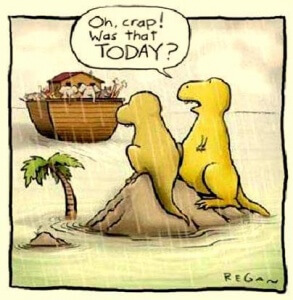
The size of the Ark has given rise to a few questions. I’ve no idea how accurate the figures in these memes are, but the idea that the Ark could have housed and fed all the animals for a year is patently ridiculous.
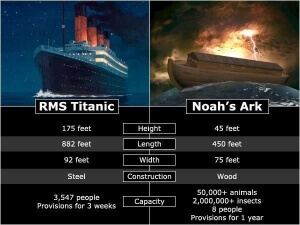
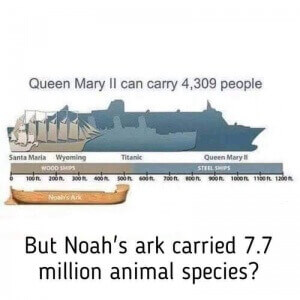

And don’t you just wish Noah had thought of this:

 But there’s a more fundamental question here. Christians believe God gave us all free will. Then he killed everyone for using it. (There’s actually no such thing as free will as science has shown us, but that’s beyond the scope of this post.)
But there’s a more fundamental question here. Christians believe God gave us all free will. Then he killed everyone for using it. (There’s actually no such thing as free will as science has shown us, but that’s beyond the scope of this post.)
And it’s not as if we’re talking about a fit of pique by God. The build went on for years during which time He could have changed his mind. In the Bible it says that Noah told people they had to change their ways, but that was hardly an effective strategy. You’ve got one very elderly man (the Bible says God made the average life span 120 years at this time – Genesis 6:3 NIV) telling the locals they need to change their ways while he builds a ridiculously large boat for his family and all the animals in the world. I think they can be forgiven for thinking Noah’s deluded.
God makes no effort to get the message to those people who live anywhere on the planet except Noah’s neighbourhood, and picks as his messenger an apparently eccentric drunk. This is not a being who seems to really want people to change their ways, but one who’s looking for an excuse to torture and murder them all. He wasn’t going to be quietly putting everyone into a sleep from which they would never wake up after all. No, they were going to suffer.

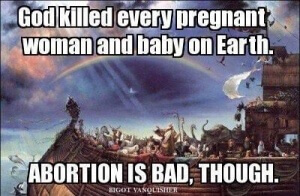



Though apparently some of the animals had their bit of fun with Noah:

Other times it didn’t go quite to plan:
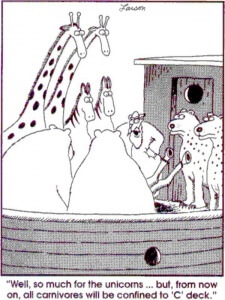
What kind of being does that make God? This is the sort of thing that makes me say that even if God were proven to be real, I wouldn’t worship him. He simply doesn’t deserve it if this is His reaction to things not going his way.

But the story doesn’t end there. When Noah, his family, and the animals finally got off the boat, a sacrifice was required.
Then Noah built an altar to the Lord and, taking some of all the clean animals and clean birds, he sacrificed burnt offerings on it. (Genesis 8:20 NIV)
It seems several of those birds and animals had been stuffed in a cage on a boat for a year just so they could be used for a sacrifice. Now you know why God directed Noah to collect seven of the “clean” animals but only two of the others. I would have thought mass murder followed by a nightmare cruise was enough of a sacrifice for anyone. But no, God needed more.
Oh yes, and that’s why we have rainbows too. Not sure how they explained the presence of rainbows before the Ark parked up on Mt Ararat as we know from science that rainbows have been with us as long as we’ve had a planet. But it does make it obvious that despite what we’re told, the Bible wasn’t written at the time of the events it’s relating, even if they had happened, which they didn’t. Because unless this God-being magicked away the water after the flood, someone really needs to explain what happened to it all.
Then, of course, everyone had to get on with repopulating the planet again via God’s favourite method, rampant incest. As the Ark Encounter website states:
Noah’s wife is one of the more overlooked characters of the Bible, considering every one of us contains some of her DNA! Come meet her at the Ark and step into her shoes to find out what we really know about her.
Anyway, the story gets very troubling after the Ark episode is over and Noah and his family get on with their lives. They establish a vineyard and winery, which is always a good career choice for an alcoholic. Then one day Noah gets absolutely blotto, which for some reason leads him to go to his tent, take his clothes off, and take a snooze. His son Ham finds him like that and laughs and tells his brothers. As you would. Shem and Japeth scuttle off and find a cloak to cover him, which they inexplicably manage by walking backwards so they can’t see him.
When Noah wakes up he somehow knows what Ham has done – we aren’t told how – and this leads Noah to curse all Canaanites to be slaves forever. Talk about an over-reaction! For this minor transgression, all of a people are condemned to servitude for all time. And Christians later manage to interpret this as meaning that Ham was black and therefore black people were meant by God to be slaves. Is this really a God or a religion that deserves followers? Anyway here’s the Brick Bible on the tale:

There’s hope for the future though, and maybe this is why so many young people in particular are becoming atheists:
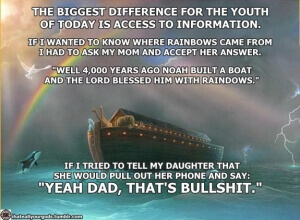
Now that deserves a rainbow! And maybe that’s why the Ark Encounter doesn’t seem to be getting a lot of visitors.
Update: My In box just received a whole new batch of excellent Noah Myth cartoons. In honour of the opening of Ark Encounter, Pliny the Inbetween has posted a collection of all the related pics from over the years at the Evolving Perspectives website. I recommend you go visit them.
If you enjoyed reading this, please consider donating a dollar or two to help keep the website going. Thanks!



Let’s hope it does poorly. I’d hate to see a whole new generation of ignorance in the south. Stories like Noah read exactly like children’s fairy tales, with a string of improbables punctuated by a few impossibles, but some adults seem to buy in too. Weird. Just plain weird. God save the internet.
In a preemptive move the FFRF have written to c. 1,000 schools, presumably specifically targeted, letting them know that because of the separation of church and state it would be inappropriate to take kids there on a school trip.
Kentucky is not “the South” nor in the South.
http://en.wikipedia.org/wiki/Southern_United_States?
Kentucky is not “the South” nor in the South. Same goes for Maryland, Delaware, West Virginia, Missouri and Oklahoma (although the Native American population of the latter territory at the time was allied with the Confederacy).
http://fivethirtyeight.com/datalab/which-states-are-in-the-south/
From up here, all the states but Alaska are in the South.
Absolutely fabulous post Heather. I love it.
Thank you Damien. 🙂
Ridicule is the only sane response to this, and anger that is was partly state funded.
That’s a place where I’d like to be – that people ridicule these stories in the same way they do other myths. You hear people say, “How could anyone have ever believed that?” in relation to Greek myths or Egyptian myths or whatever, but then think stories like Noah’s Ark or the Jesus myth are real.
The first time I heard about the state funding during construction I thought they weren’t going to be allowed to put the employment conditions they wanted on if they got the money – looks like that didn’t happen either.
It reminds me of the CNN Town Hall with Paul Ryan I’ve just been watching – he insists the Republican platform is everybody being equal before the law, but the draft that’s just gone to delegates includes a statement about same-sex marriage having an adverse effect on children, and they support the so-called religious freedom laws some states are enacting. It’s a bit like religion – love thy neighbour except when they engage in x sin.
I’ve been told on Twitter about a fun new Twitter account: @KenHamsArk which describes itself as:
I am Ken Ham’s life sized replica of Noah’s Ark. Yes, I’m a building made of concrete, steel, & wood. I opened on July 7, 2016.
It’s a parody account.
The irony, of course, is that your theology is no different from Mr. Ham’s.
What a sad little life you must lead if this is what you do for fun.
And yet you’re the one who’s always cross. Go figure.
At least my character flaw is that of not suffering trolls well, rather being the troll.
Oh, I wouldn’t say that’s your biggest flaw. But enough with the fault-finding, let’s carry on being pals.
The fact is j.a.m. that most Christians do not espouse to the sophisticated theology that you do – they believe God is an actual being, and if asked to draw Him, he’d look a lot like Santa in white robes. A majority also believe at least some of the myths of the Bible. More than 40% of USians believe the earth is 6-10,000 years old for goodness sake, because that’s what the Bible says. The schools of the South, which I think Ken has made a good case includes Kentucky, have a lot to answer for in this regard.
Lol, jam espouses a sophisticated theology? We just had a huge debate on theology in another thread where he displayed nothing sophisticated at all, just the usual false logic, insincerity, evasion of hard questions and outright bullshit one would expect. Just rejecting creationism is obviously not enough to propel one into the realm of the sophisticated.
Let’s see, theology or geography? Shall we start with geography for $100? The regional designation is purely a matter of opinion. The fivethirtyeight.com survey I cited reports what real people think. Nobody but nobody (6%, to be precise) thinks that Maryland is in the South, as the census bureau claims. Only half would count Kentucky, and that is not a passing grade. Moreover, Kentucky did not secede, which is a deal-killer. The lame attempt to rebrand KY fails.
How silly to talk like Kentucky was never considered part of the South. Maryland even more so. Not just because the Mason Dixon line was the original agreed boarder, nor that it was a slave state where Lincoln’s assassination was plotted, but because Maryland would have seceded if Lincoln had not garrisoned Baltimore and kept it from happening (much unlike Tennessee, which voted to stay in the Union).
I could also point out that the rare, double equestrian statue in the Wyman Park Dell between The Johns Hopkins University and Baltimore Museum of Art is not of Grant and Sherman, but of Lee and Stonewall Jackson. And that it was erected in 1948.
Now I agree that things change over time and most of Maryland (note I said most) is not culturally part of the South any longer. I usually say I’m geographically from the northernmost Southern city but culturally from the southernmost Northern city, and both are accurate. The only lame thing is trying to convince people there is only one valid definition of what it is to be part of the South.
http://www.theatlantic.com/national/archive/2011/01/where-does-the-south-begin/70052/
Turning to theology, my only point — by no means original — is that the YouTube atheists and YouTube fundamentalists operate from the same premises. By all means reject the shared atheist/fundamentalist description of God. Where does that get you?
As your unoriginal point is also no more than unsupported assertion, your question requires no answer. An original thought might help, but if you don’t even intend to try to do any better than last time, we’d all prefer you save your breath.
The evidence that is not there for the “YouTube-atheist god” is, unfortunately, also not there for the sophisticated theological god, as well as the respectful looking-down-the-nose capital letter “God”, and for the sincerely believed, solace-giving God.
The smart and respectful thing for religious people to do is just admit they have no evidence; to see that having no evidence is the essence of faith; to and accept that this means that they don’t have the right to try to force others to agree with it. (The only ones bothered by this are theocrats and their unreflective supporters.)
Trying to argue that your religion has some basis in fact necessarily implies being able to define your terms clearly, which in turn necessarily implies taking your scriptures literally. This is at worst deadly, and at best unbearably tedious.
Maybe you missed the time when we explained to our dear elder Ken that you can’t claim there’s no evidence without saying what evidence you’re looking for.
Faith means setting out trustfully into the unknown. It is “unevidenced” only in the sense that no one has “evidence” of the future.
“Explained” is jam’s euphemism for “bullshitted”. The problem is that you have no evidence to offer of either the future or the past. That adds up to no evidence at all, if you would only admit it.
Thing is we’re not so far apart when you say “faith means setting out trustfully into the unknown”. I think we could all agree with that, as it is entirely compatible with “believing despite lack of evidence”, so long as you stop trying to redefine common words. To insist on having it both ways is not trustful, but seems rather cowardly.
Thanks for the explanation, Ken. I couldn’t make head or tail of that comment. I didn’t realize jam had already cleared up the questions about god’s existence and how to live. Though I don’t know why s/he is explaining it here to us, instead of trolling theologians and priests all over the world who claim that nice sunsets and DNA and e equaling mc squared is evidence for God’s existence.
Well if we’ve finally found something we all can agree on, praise the Lord! Now, why is setting out trustfully into the unknown unreasonable?
And what evidence is there that evidence always and necessarily trumps reason?
Evidence supports a hypothesis. If the evidence does not support the hypothesis, then the “reasoning” is flawed, and the hypothesis must be tossed and another one conceived, taking into account what is observed.
“Just trust me” is said by every schuyster under the sun, whether common crook or false purveyor of nirvana. Evidence helps one make good decisions and keep one from disastrous mistakes. It is an indispensable part of effective reasoning, not separate from it. You are free to jettison this crucial tool if you like, but to insist the rest of us should is entirely against reason.
@Ken: First, thank you for acknowledging that we have a choice. Maybe we’re getting somewhere.
If you’re serious about using evidence to avoid disastrous mistakes, I can only imagine the degree of due diligence you must undertake before boarding an aircraft (auditing maintenance records and security procedures, running background checks on flight and ground crews, ad infinitum). After all, the stakes could not possibly be higher (unless you consider eternity, which you don’t).
But as per usual you’re chasing straw boys. No one argued against informed decision-making. The question is whether it’s ever reasonable to proceed on the basis of prudent judgment in the absence of perfect knowledge — i.e., take a leap of faith. I hope so, because otherwise all human relationships would be impossible. No matter how much evidence you gather to buttress your belief that another person is trustworthy, you will never know.
Now, you are free to choose to conceive of yourself as nothing more than a data-crunching machine calculating probabilities, if you find that a satisfying way to approach life and relationships. But you don’t know that. You are equally free to choose otherwise, and it is just as reasonable (at least) to do so.
no one needs to take a “leap of faith”. One can and does trust others, because there is a series of facts that allows one to trust them, e.g. that they have done the correct thing before and will continue to do so, that the laws of physics have worked and will continue to do so etc. There is no fact that shows that any god does anything, that theists benefit from anything better than nontheists. We also have the fact that many, if not most, theists run to science and trust the laws of physics when it comes down to it. Even the leaders of religions run to science rather than trust that their god will heal them.
@jam,
You are using a lot of conflations and false equivalencies.
At issue above all is claiming to have knowledge one does not have and trying to get others, especially children, to follow you. This is what Ken Ham is doing. I reserve to right to denounce and ridicule people who take a leap of faith on matters of fact while claiming more certainty than they can have.
The false claim that all types of faith are the same is the oldest ruse in the book. You have faith that your next plane won’t crash because you know personally that planes usually fly safely; because you know that there are people who understand all the physics and engineering, even if you don’t; because you know there are laws and regulations designed to ensure that safe flying is a repeatable thing; because there is so much evidence that it is safe that you’d be an idiot to pretend otherwise. In other words, you have all the evidence supporting your faith in safe flying as a concept (and it doesn’t have to be absolute) that you completely lack for faith in a god as a concept, let alone for a specific god among the thousands to choose from. There is in no sense the sort of leap of faith required for flying in a plane that there is for believe in god.
Furthermore, your faith in safe flying is completely contingent on this evidence. If the evidence changes, say a certain model plane starts having crashes, your faith will be destroyed and you won’t get on that model plane in the future. That also isn’t true of faith in god, because the issue isn’t about lacking absolute surety, it is between having a lot of evidence and having none at all.
We’re saying it’s safe to fly in a plane because the evidence shows that to be true. We have “faith” in this evidence, but that is shorthand for “contingent faith”, as it only applies until evidence to the contrary presents itself. You come along and say we can’t be 100% sure we’ll fly safely in the plane, so we might as well jump off a roof with you today. This is worst than juvenile reasoning and quite tedious. You’re supposed to preach “sophisticated theology”, whatever that means. But you present nothing new, no original thought, nothing that we haven’t heard from your hated youtube religionists, just the same old illogical arguments and wishful thinking. You are as much a fraud as them.
@Vel: You seem sweetly innocent of the fact that we have a whole court system dedicated to adjudicating breaches of trust in both the commercial and domestic realms. In most cases, one or both parties entered into a relationship in good faith, based on convincing evidence that the other party would prove to be trustworthy. But such evidence did no good, because evidence of past performance is useless in the future.
@Yakaru: I fully agree with your second paragraph. Regarding the first, you’ll have to give me a for-instance.
@Ken: I wonder if you even read my last post? At the risk of merely repeating it, nobody is against informed decision-making. By all means, take account of what you know. The question is what to do about the unknown. Is there any case when it is reasonable to make a prudential judgment about the unknown, to take a calculated risk, to make a leap of faith? Is it ever reasonable to trust someone? Behind all your cross words, you seem to say yes to both, and I agree. (BTW, as I’m sure you know, insults and ad hominems and straw men usually betray a weak position.)
“@Vel: You seem sweetly innocent of the fact that we have a whole court system dedicated to adjudicating breaches of trust in both the commercial and domestic realms. In most cases, one or both parties entered into a relationship in good faith, based on convincing evidence that the other party would prove to be trustworthy. But such evidence did no good, because evidence of past performance is useless in the future.”
that’s hilarious since we know this not to be the case in every situation by your own actions. You trust that the evidence of past performance is useful in the future because you don’t need to check that your computer is plugged in each time and it will send a message to a blog post, that you use modern medicine without question, that you use electricity because you trust that from past performance it will work and will be there.
People do enter into agreements based on past performance and in the vast bulk of those arrangements, it is warranted. As you point out there is a legal process in place when this trust based on past performance is broken, and the fact that this exists demonstrates that breaking a trust is the exception to the rule. If it weren’t, then no one would trust anyone and nothing would get done *but* legal challenges.
Again it seems that reality shows that the claims of a theist are simply false.
There’s no reason you j.a.m. cannot take a leap of faith. What you cannot do is contend that because you weren’t damaged by doing that, it proves that God is real.
I say there’s no God and if he’s real he could prove it by preventing me from posting this sentence. But you’re reading it, so that didn’t happen.
My point is you’re free to believe what you like, but there’s nothing you can offer that provides proof of your belief.
Ad hom is attacking the person instead of dealing with their arguments. I surely can’t be accused of that, and in fact address far more of yours than you ever have the courtesy to do of mine. I just call a spade a spade.
But as you think we agree, where does that leave us?
@Ken: Well, we could try to work on your chronic grumpiness. I’d be grumpy too if I were trying to rationalize a dreary and vacuous ideology.
@Vel: Divorce may be the exception, but that data point is meaningless if it happens to you. (I’m not sure it would be accurate to say that the “vast bulk” of marriages avoid that unfortunate outcome.) Anyway, if you’re going to argue that most people show good judgment in placing their trust, then I can argue that most people show good judgment by placing their trust in God.
‘@Vel: Divorce may be the exception, but that data point is meaningless if it happens to you. (I’m not sure it would be accurate to say that the “vast bulk” of marriages avoid that unfortunate outcome.) Anyway, if you’re going to argue that most people show good judgment in placing their trust, then I can argue that most people show good judgment by placing their trust in God.”
Please do attempt to argue that most people show good judgement in placing their trust in your version of your god. In that most people don’t believe in the same god that you do, this should be interesting.
You would also need to show that people who agree with you in religious matters benefit from this blind faith, for it is not trust, or a conditional faith which is based on facts that show that belief has a benefit. Please do show where you, and those agree with you, do not suffer the same maladies as others, the same griefs and miseries. Show that the promises made in the bible actually come true, that you are taken care of better than others, that you are healed by this god or believers from sicknesses that others suffer from.
I’ll be pleased to wait for your evidence.
@Vel: If a person places their trust in God, they do so according to the dictates of their own conscience. I can’t imagine how it could be otherwise. So yes, they experience God somewhat differently, or much differently. Various traditions have emerged. So what?
As for the rest of your post, you go into your own way of describing God. It’s not anything I proposed.
“@Vel: If a person places their trust in God, they do so according to the dictates of their own conscience. I can’t imagine how it could be otherwise. So yes, they experience God somewhat differently, or much differently. Various traditions have emerged. So what?
As for the rest of your post, you go into your own way of describing God. It’s not anything I proposed.”
this is a common attempt by a Christian to make believe that everyone “really” worships their god even though there is no evidence of this and plenty of evidence to the contrary. The “so what” is that theists murder each other for not worshipping some god correctly or perceiving it correctly.
It’s always amusing when a Christian claims that I’m somehow inventing the god I’m describing when that is far from the case. The description I use is right from your bible, jam. You are a Christian, correct?
You have claimed that you could do the following “I can argue that most people show good judgment by placing their trust in God.”
it is no surprise that you suddenly are unwilling to do so. You cannot show that everyone “really” worships your god. Again, that’s a common bit of nonsense given by Christians in order to invent external validation that everyone agrees with them. Where is the evidence that anyone benefits from this blind faith, that your and their lives are better than mine? The bible promises that this god heals and those that believe in it can heal. It promises that *anything* asked for in its name will be granted, with no caveats.
You claim that the Jews have had faith (“put their trust”) in this god. This is nothing more than a appeal to popularity and an appeal to tradition. It is the same with Christians. Still no evidence at all that this god exists, and plenty of evidence it doesn’t since none of the essential claims of either the OT or NT can be shown to have happened. None of the promises made have happned. You claim that the Jews are wrong as a Christian, so it’s rather silly to claim that they are right now.
@Heather: The Jews have put their trust in God for forty centuries. The followers of Jesus have done so for twenty centuries. To hold that you’re right and they’re all wrong would be a truly extraordinary claim. To put forward such a claim on the basis of a rather silly theology that posits God as some kind of divine blog editor would hardly seem convincing, would it?
Just because we cannot see the summit is a foolish excuse to stay put in the valley and never set out.
Believing something for a longer time doesn’t it more true, it just makes it more likely you won’t admit it if you’re wrong. The Egyptians believed in their gods for five millennia. The Zorastrians have been going for at least 3.5 millennia. It’s in my lifetime that scientists discovered continental drift – before that they thought they were fixed. It’s only a few hundred years since humans started to know the earth was spherical – before that they believed it was flat. Belief means nothing without facts to back it up.
It’s theists who are staying in the valley, protecting themselves from knowledge with the cloak of their belief in the supernatural. You may accept scientific discoveries like evolution, but you also believe in the resurrection of Jesus. That isn’t possible without the suspension of natural law, which requires magic/the supernatural.
I shed that cloak, and my mind is no longer confused by the cognitive dissonance required to both accept scientific reality and believe in a god for which there’s no proof.
Poor analogy, as there is always past evidence of the summit even if we can’t see it now. If you said that in a Kansas corn field on a clear day, it would indeed be foolish to set out.
Every conception of god humans can imagine has exactly the same likelihood as any other and none are convincing. If you couldn’t muster an argument against Zeus you can’t argue against the divine blog editor either.
You don’t seem to realise that we’ve also chosen according to the dictates of our own consciences. Just get over it and move on.
If I seem grumpy, it’s because we started with “faith is belief despite lack of evidence” and ended in almost exactly the same place after a debate spanning several weeks. I took a leap of faith (despite evidence to the contrary) that your “sophisticated theology” would be materially different than the other dross. I should have trusted the evidence in stead.
@Ken: Of course you are entitled to believe any fool thing you want. However, foolish notions aren’t entitled to respect.
My analogy is quite apt, even with your little adaptation. One never sees the summit, or has a word for summit, if one is an inch high at the foot of a cornstalk. Instead he foolishly propounds the theory that all reality is nothing but cornstalks.
“My analogy is quite apt, even with your little adaptation. One never sees the summit, or has a word for summit, if one is an inch high at the foot of a cornstalk. Instead he foolishly propounds the theory that all reality is nothing but cornstalks.”
Which reduces down to j.a.m. wanting to pretend he and only he knows the name of the “summit” and has seen the “summit”. The problem with j.a.m.’s fantasy is that we have climbed the “cornstalks” and there is no god to be found at all, no “summit” but the expected tassels and the sky above. None of the claims of any of the religions are shown to be true, and there is evidence that entirely different things are true rather than petty gods who are nothing more than humans writ large.
Still waiting for j.a.m. to provide evidence his version of his god is real and does anything, anything at all. We have yet to see that believing as j.a.m does is of any benefit and there is any reason to believe in it.
@Heather: Yes, millions of people across countless generations can be wrong. However, the possibility they are wrong does not mean you are right. Statistically that remains an extraordinary and implausible claim.
If man created God, then before that there was only atheism. There’s nothing modern or scientific about it.
I’m sorry to hear about the confusion. There’s nothing inherently confusing or dissonant about trust in God. There’s no good reason to believe that all truth is reducible to dry fact. In any case, the remedy for confusion and cognitive dissonance is not denial but courage, not less wisdom but more.
And theists don’t have the courage to face the world without the idea that there’s a god backing them up, or the humility to admit that we’re all of equal worth and there’s no god separating anyone out for special treatment because they’re better than the rest of us.
All the good things that religion supposedly brings we can have without religion, but religion also brings a lot of baggage the world is better off without.
Using one’s even limited perceptions is way better than just making shit up.
Heather, now honestly that’s just silly. The Judeo-Christian tradition, for one, very explicitly teaches that every human person bears the divine image and therefore is of infinite worth. Atheistic materialism teaches that a person is nothing but a meaty robot and therefore is of no real worth.
There is no “god” backing us up, but trust in God enables true personal and social flourishing, happiness, freedom, and peace.
God is not the same as organized religion, but people naturally want to come together to share God’s gifts. No good can come from outright ingratitude for those gifts.
“The Judeo-Christian tradition, for one, very explicitly teaches that every human person bears the divine image and therefore is of infinite worth. Atheistic materialism teaches that a person is nothing but a meaty robot and therefore is of no real worth.”
because, you know, this god repeatedly murders and orders murdered these beings of “infinite worth” and requires them enslaved, ordered not to resist a master that is harming them.
Funny how j.a.m. outright lies when he claims that atheism teaches humans have no “real” worth. I wonder, does j.a.m. know of Romans 2 where it says that lying for this god is a very bad thing in its eyes?
@Ken: By all means use your powers of observation to the full. Just never delude yourself into thinking they are more than a fraction of your mind’s capacity.
I said perception, and mean all of our mind’s capacity. Yet there are still things we likely will never have the ability to perceive. And that’s fine, nothing delusional about it. The only deluded people are the ones who just make shit up.
“Of no real worth” is just the lie you tell yourself to make the shit you make up seem more reasonable. Atheistic materialism merely teaches that the worth we assign is entirely our decision and responsibility. It doesn’t depend on anything made up.
“Make stuff up” is the lie you tell yourself to rationalize malarkey. Decision and responsibility? A machine lacks any capacity to make free rational decisions, any capacity to choose except by rote or algorithm, and certainly any capacity to accept responsibility. But as persons we do indeed have those capacities, as you acknowledge, and that fact undermines the premise of atheistic materialism.
So yes, one’s personal answer to the question, Who am ?, is entirely our decision and responsibility. The most rational and responsible response is to place one’s trust in God.
Try this video j.a.m. The idea of Free Will vs Determinism is a complicated one (I’m not being patronizing – it really is!) but an understanding of the concepts might help you get why we don’t buy your arguments. You’ll find longer ones on YouTube as well, or check out Sam Harris’s book on the subject: ‘Free Will‘
https://youtu.be/yyp3ygZeNng
“Invisible Pink Unicorns are beings of great spiritual power. We know this because they are capable of being invisible and pink at the same time. Like all religions, the Faith of the Invisible Pink Unicorns is based upon both logic and faith. We have faith that they are pink; we logically know that they are invisible because we can’t see them.”
No argument you’ve offered us is any better than that, either in fact or logic. Believing something is true when there is no evidence for it is neither rational nor responsible no matter how many times you say it. Once you dispense with the need for evidence, you open up all manner of madness, as you’ve given away the only tool we have to judge between one person’s faith and another’s.
And science is showing how wrong you are about free will too.
@Ken,
All very well said, sir!
@jam
“The most rational and responsible response is to place one’s trust in God.”
I will overlook the irreducible complexity of that sentence, and simply ask, And then what?
@Ken: Observation is not the only tool we have to protect ourselves from madness, or to judge between one person’s faith and another’s; we have the light of reason. What evidence is there to justify the dogmatic assertion that all truths are contingent upon physical evidence? It’s self-refuting. You can choose to believe that materialism is true, but you can’t know that to be the case, much less claim that you know it from physical evidence. It is no more and no less than a guess, mere conjecture.
As for free will, you’re the one who said, “the worth we assign [to our lives] is entirely our decision and responsibility”. I’m not sure how to understand that statement unless you are referring to some form of free will.
If it’s entirely our decision and responsibility, then do we do better by trusting God or by denying God? I find the evidence that God is trustworthy to be compelling. That is a personal judgment, like my conviction that everyone is born equal and endowed with inalienable rights. I am interested in cogent arguments that God is not trustworthy, but I can’t say that arguments involving ark parks, pink unicorns, or flying teapots fit that bill.
j.a.m. When people say, “I find the evidence that God is trustworthy to be compelling,” which is a common statement from theists, and you ask them to state their evidence, it always seems to me that they’re a victim of confirmation bias. There have been several studies on this, and last year or the year before there was a British TV series that recreated the tests done which showed how we are all victims of the way our brains work. I know most (or maybe all) of the six episodes in the series are available on-line, but I can’t remember the name. Maybe someone else can? They were presented by a well-known illusionist – he uses several of the ways our brains trick us to complete his illusions.
@Heather: Glad you clarified that you’re not being patronizing, because one might easily have thought otherwise.
Feels like we’ve shifted gears. Are we now debating free will versus predestination? Because to this point you have conceded that “you’re free to believe what you like,” and Ken has said things like, “the worth we assign [to our lives] is entirely our decision and responsibility”. I’m not sure how to understand such statements unless they are referring to some form of free will.
The practical question for most people is, to the extent that I perceive that I can form my own convictions, how does committing myself to a materialist, determinist ideology lead to a better life?
still waiting for you to show how believing in a god (your version or any at all) leads to a better life. for all of the promises of healing by magic, there is no evidence for it. For all of the claims of money ministries, the only people getting wealthy are the preachers.
There’s rather a lot here, so let’s take these one at a time. Tell us how “the light of reason” works by itself in the absence of evidence. Be sure to avoid circular reasoning when doing so. Examples may help.
@Heather: Agreed, and I would hope that each of us does consider our own opinions, judgments and convictions to be provisional, subject to further reflection and new knowledge. The quest for truth goes on. (Of course, to undertake that quest means having faith that the truth is out there and can be known.)
At the same time, if you want to call it bias, I do take the idea of “God” to be a signifier for the source and summit of truth. Seeking and knowing truth is inseparable from seeking and knowing God. As the philosopher St. Edith Stein wisely put it, the lifelong search for truth is one continuous prayer.
@Ken: For example.
– All circles lack angles.
– Every finite whole is greater than or equal to any of its parts.
– Everyone is born with equal and inalienable rights.
– All ballet performers have the ability to dance.
– All things considered, it is better to be happy than sad.
– Everyone is innocent until found guilty by a jury of their peers.
– Torture is wrong.
– The right to vote cannot be denied on account of sex.
– The means ought to be proportionate to the end.
– Truth exists and can be known.
Now, tell us, what “evidence” is there to justify the assertion that every assertion must be justified by “evidence”? That which can be asserted without evidence can be dismissed without evidence, including this statement.
Your conclusion doesn’t follow, because all of these are bad examples, either because they link to the physical world in which evidence can be produced in support or not, are true by definition in the logic system in which they reside, or are just opinions. Worse, none of them comes close to the issue we’ve been debating of whether there is good reason to believe in a god and particularly how we can “judge between one person’s faith and another’s”. That’s what you need to tell us how to do.
“@Heather: Agreed, and I would hope that each of us does consider our own opinions, judgments and convictions to be provisional, subject to further reflection and new knowledge.”
This has been our position all along. You’re the one that doesn’t believe it to be true because you don’t include as provisional your conviction that there is a god.
“(Of course, to undertake that quest means having faith that the truth is out there and can be known.)”
It only requires the type of contingent faith that we have, not the kind of faith needed to believe in god.
“Seeking and knowing truth is inseparable from seeking and knowing God.”
This is the contradiction. You claim above that opinions, judgements and convictions should be provisional, yet define your terms so as to deny that possibility.
@Ken: You asked for examples of beliefs whose validity we can establish by reason without reference to physical evidence. I gave more than ample examples to underscore the absurdity of the self-refuting assertions that every assertion must be justified by “evidence”, and that reason never suffices to protect us from falsehoods.
You can judge a belief system by whatever criteria you choose. For my part, I want to understand whether and how it enhances my ability to engage the central questions of life and gain wisdom.
Re your second comment, I don’t believe in “a god”, let alone your god. I do take for granted that truth is really real, and finally is of one whole non-contingent essence traditionally identified with God. I’m not sure how it could be otherwise, but I’m more than happy to discard that idea if a better one comes along. You read in a contradiction that isn’t there.
“All circles lack angles.
– Every finite whole is greater than or equal to any of its parts.
– Everyone is born with equal and inalienable rights.
– All ballet performers have the ability to dance.
– All things considered, it is better to be happy than sad.
– Everyone is innocent until found guilty by a jury of their peers.
– Torture is wrong.
– The right to vote cannot be denied on account of sex.
– The means ought to be proportionate to the end.
– Truth exists and can be known.”
this is quite a mix of things that can be known by reason *and* physical evidence and things that are subjective values.
There is still no evidence for a god as claimed by j.a.m. the Judeo-Christian god from the bible. There is no evidence that his version of hi religion is any more true than any other religion or even sect of his religion.
Like so many other theists, j.a.m., you want to pretend that your god is equivalent to truth. You have the presupposition that only your god is the real one and that there needs to be a god. You cannot show that either is based on reality.
The search for truth is not a prayer. A prayer is the useless action of beseeching an imaginary being to do something or even more pointless, thanking an imaginary being for doing something when it evidently ignores the prayers of others who are in far direr situations. The search for truth is following the facts where they lead, not coming up with a fairy story and trying to force everything to fit it. Most, if not all, theists try to do this, insist that the universe is evidence for their god and only their god. Surprise, none of you can show this to be the case. Your faith is just like the faith of the other theists you insist are wrong. There is no reason to believe any of you.
Still waiting for evidence for your version of your go, j.a.m. Still waiting for you to support your claims that there is good reason, e.g. facts observed to support a position, to believe in your god and not the thousands of others. You have yet to show your god “trustworthy” and that it exists at all. I have shown by your own bible and its failures that your god is not trustworthy and the stories are nonsense. Your claim ““The most rational and responsible response is to place one’s trust in God.” At the moment is entirely baseless.
@heather
Would this be the documentary series you were thinking of: The Brain with David Eagleman? http://www.bbc.co.uk/programmes/b06y8hyr
No, that’s not the one I was thinking of. I don’t think that one’s been on here – I don’t recognize it anyway. Thanks.
The context has ALWAYS been about belief in god and how we avoid the madness of everyone’s different beliefs being equally valid. You know that and I wouldn’t be wasting my time otherwise. Even if your examples were valid, it would say nothing about that question. You’re just avoiding the issue, as you have all along.
@Ken: Yes (again), we really can keep madness at bay! Notwithstanding the fact that people hold a variety of opinions, judgments, convictions and beliefs about God and everything else, we really can differentiate and evaluate philosophical doctrines or beliefs and assess their validity rationally. A key criterion for me (again) is whether a set of beliefs actually enhances my ability to engage the central questions of life, or not. I’m not sure I can put it any plainer. Where is the difficulty?
@j.a.m “A key criterion for me (again) is whether a set of beliefs actually enhances my ability to engage the central questions of life, or not.”
how does believe in your version of your religion “enhance” your ability to engage with the ‘central questions of life’ (something you have yet neglected to explain) and how do those other sets of beliefs fail?
all I’m seeing is one more theist who wants to pretend that his religion is better than anyone else’s and has nothing to support that claim. Most, if not all theists, want to pretend that their religion and theirs alone is the only one that can answer these mysterious questions “correctly” and all try to make the same claims e.g. that the universe is evidence for their god and their god alone, that the “right” morals come from their god and their god alone, etc.
The difficulty (again) is that anyone can say that about anything they want to believe and the madness (again) is obviously NOT being kept at bay. You describe a process that may be satisfying for you and relatively safe for the rest of us (though I’ve heard enough of your political views to be very unsure of that), but which cannot be generalised to the world at large, because it is entirely subjective.
People have enough trouble with actual facts. Once you dispense with all grounding in objectivity, you won’t get them to agree even on the central questions of life, let alone what might be very bad answers.
@Ken: At this point we’re just rehashing your position that reason is madness and observation is infallible. With respect, I remain unpersuaded that such is the case, or that such a viewpoint is the basis for a better life.
@j.a.m. it is unfortunate that you find it necessary to make false claims about what Ken has written. It is always curious that a self professed Christian would have no problem in ignoring the commands of his god in order to make false claims.
What “reason” do you use to believe in your god that other theists do not use to believe in their god? Why don’t you believe their gods since they do use the same supposed reasoning as you do? What evidence do you have that your beliefs influence a “better” life for you and how does your life differ from others? Please do also define what you mean by “better”.
I haven’t for a moment argued either of those things. No wonder we go around in circles.
Yes great post. Enjoyed reading it. Still with all the religious people out there you know they still believe. In the Ark and all the other stupid stuff. I have a few facebook friends well not really close friends but will recommend they read your article. They are religious crazy one guy really is,but will tell them.
My cousin’s son has gone ultra-religious and I always wonder what he thinks of posts like this, if he even reads them. He frequently posts verses from the Bible and inspirational stuff about putting his life in the hands of the Lord which seems to be very popular amongst his friends. He’s Maori and one day his Bible verse was one of the ones used to justify slavery, which he didn’t realize until I let him know. I don’t think he knew the Bible had been used to justify slavery, though we never had it in NZ so it’s not part of our history. His extended family all liked my comment about the evils of slavery, but it hasn’t dented his faith at all.
As usual excellent post, between Jerry’s website
And yours I always feel I’m learning top-notch relevant stuff every day, and by doing so
I am the “smartest one in my office”.
.
My two cents on this topic, is when I first saw the picture of the boat they were building with the scaffolding around it, and all the resources that ken ham is using to build this stupidity,
It made me think of all the lower income and homeless people that live around that area that he’s building the park, and all the low income homes and apartments that could’ve been built using that wood and the people building that stupid fake ark.
The hypocrisy is palpable. What a total and complete waste of resources.
My secret hope is that the park does poorly, and does not generate enough income to pay its bills, and goes bankrupt. Then we should all help Planned Parenthood buy the thing,
And turn that ark into the world’s largest and safest planned parenthood women’s health clinic! Where women from all over the United States can walk safely “two by two”
To exercise their right to a safe
first trimester procedure as guaranteed by Roe versus Wade.
The irony would be “biblical”!!!!
Keep up the good work with your website .
Yes, a very good point, these millions could have been so much better spent. I never even thought of that. How blind can one be..:(
Talking about WEIT, I rarely post on Jerries website because 9 out pif 10 posts don’t get through. I don’t know why, a few do.
Another point, would this KenHam Ark even be able to float?
Thank you both. 🙂
What a cool idea – Planned Parenthood in the Ark! Now that would be an Encounter!
There’s a beautiful old church in NZ (old in NZ = it was built between 1864 and 1904) that was destroyed in an earthquake in Feb 2011 – the Christchurch Cathedral. It would cost millions to restore it to the original. The bishop, who seems to be a pretty cool lady, wants to replace it with a church that the insurance money will allow but she’s being prevented by a group who want it restored to the original which means tens of millions in fund-raising. The bishop wants to focus on helping people but this group seems to think the building is the most important thing. Similar situation I think.
Noah’s story was one of the first to make me question the bible.
As an 8-9 year old we had a cat, and I had guinea pigs, mice and axolotls. To take care of their effluents (say shit and pee) was quite a job, and a job I did not really enjoy, for that matter. Especially the mice needed very regular cleaning, they stank easily.
I knew by then that there were hundreds and hundreds of species (I had no concept of millions at that age) and realised that an 8 man team or even double that could never ever keep it viable for even a week.
I also could not understand how mischievous monkeys could not have been specifically mentioned in the bible.
And then the food, what would the lions and leopards and cheetahs and tigers and jaguars and jaguarundies and servals and ocelots and snow leopards and etc (I had a book with >60 species of wild cats) eat? If only 2 of every species, they would quickly have decimated the ranks of the prey. [And no, we had a cat, she would never ever eat hay or corn flakes or anything other than meat (preferably out of a can). so a veggie diet did not cut wood with this 8-9 year old.]
The conclusion was that the bible could not be always literally true.
With hindsight one could say that the shit in the Ark was my first epiphany 🙂
The fact that this monstrosity was funded with taxpayer money is horrible. It seems separation of church and state here in the US is given lip service but not followed.
Yeah. I’d really love to see “In God We Trust” taken back off the money. It was put there because the president at the time was a recent convert to Presbyterianism and as a reaction to the Cold War. That’s long over and the secular state envisioned by your founders should take control again imo.
The “founders” did not envision a “secular” state. The original Constitution of course had no Bill of Rights prohibiting an established church.
The drafters of the Bill of Rights envisioned a non-sectarian federal government, but of course that had nothing to do at the time with the states. Massachusetts had an established church until the 1830s.
More importantly, neither the Constitution nor the Bill of Rights ever would have seen the light of day if the populace at the time seriously thought they were creating a “secular” state.
Religious toleration and pluralism do not equate to secularism.
No, but Article IV does prohibit religious tests for offices, both at the federal and state level. So even if Massachusetts had an established church, one did not (or, by law, should not) have to be a member to serve in in the federal or state legislatures.
Since the government isn’t supposed to privilege any specific faith, it is limited to dealing with those items that all members of any faith can agree on, and thus (IMHO) has to be secular (worldly, as opposed to spiritual).
Government is limited to dealing with those items that all members of any faith can agree on? Really? Now there’s a libertarian! I like it.
And secularism doesn’t mean atheism, except in the US where “atheist” has such negative connotations they had to find another word to use.
With an ink pen and some imagination “In God We Trust”, on any bill, can be changed to “Darwin + DNA = We Evolve”.
Ha! What a good idea. 🙂
Well, the chastity pledge et al does show how Christians pick and choose what they want to force on others. If science is so “wrong”, then ol’ Ken should have his employees pledge not to use modern medicine, cars, computers, modern foodstuffs, etc, since the same science that shows his religion and his ark are nothing but fairy stories is what is responsible for all of those nice modern things that make us comfortable.
When we were kids and had to do morning talks at school, my brother (aged 7) had a classmate whose family belonged to the Exclusive Brethren Church. His morning talk was about how he went with his dad to buy a new car, but they couldn’t take it home because it had a radio in it. My brother asked him why they couldn’t have a radio. His classmate said, “Because God didn’t have a radio.” My brother’s response: “But God didn’t have a car either.”
Heather – Thanks for this. I also found your blog through WEIT, and find it to be a refreshing change from the “angry” atheism that I see displayed too often on the interwebs.
I’ve long suspected that the flood story derives from early observations of the flooding of the Eurphrates and Nile (where the earliest Sumerian and Egyptian cities were located), coupled with the discovery of various fossilized prehistoric fish and gastropods in places not known for having water (“How’d this shell get up on the top of this mountain? Must have been a great flood.”)
Anyways, just my 2 cents. Keep up the good work!
Thanks Eric. I appreciate the support. 🙂
Most civilizations in the region have a flood myth, and as you say, it was an explanation for marine fossils atop mountains. I’ve also wondered at the possibility of a cultural memory of the waters breaking through from the Mediterranean to the Black Sea – that must have been quite an event.
If Ken Ham wasn’t such a hypocrite he’d demand the same kind of pledge from his visitors. But my guess is he’s more concerned with making money than he’s really concerned about others morality.
Yes! It’s funny how that works. It’s a bit like the “closely held beliefs” of Hobby Lobby’s owners doesn’t stop them making money from customers who use contraception, or selling goods made in places like China that have enforced contraception and abortions.
I’ve just added this to the post:
Update: My In box just received a whole new batch of excellent Noah Myth cartoons. In honour of the opening of Ark Encounter, Pliny the Inbetween has posted a collection of all the related pics from over the years at the Evolving Perspectives website. I recommend you go visit them.
Genocide I get. But where is the incest (except among the other unclean animals)?
Noah’s grandchildren would all be first cousins. And since Charles Darwin and his first cousin got it on, and got it on very productively, I think that should be considered OK.
Still, of course, there is a word for any animal species that has only two surviving members. We call them “functionally extinct”.
@Heather,
“Believing something for a longer time doesn’t it more true, it just makes it more likely you won’t admit it if you’re wrong. The Egyptians believed in their gods for five millennia…..”
Yes. It is clear that religion (at least the Abrahamic ones) doesn’t really progress. Theologians still have not taken any significant step further than Plato, and much of it is nowhere near as advanced as some of his ideas were, relative to modern science. You get the occasional cultural blossoming, but it’s lost just as quickly as it arises.
considering that the promises made by this deity have not been fulfilled, j.a.m., there is plenty of cogent arguments on why your god doesn’t exist, much less that it is trustworth.
Let’s consider the promise made by your god, via its supposed son, that anything asked for would be given, with no caveats at all (Matthew 18:19). Is this the case or is it not, considering how many people suffer thanks to this god doing nothing?
Consider the promise that baptized believers will be able to do the same miracles as JC (Mark 16) and that they will be able to heal people like JC (James 4). IF this promise is true, where are the Christians who are healing the folks in childrens hosptials and veteran’s hospitals? Indeed, why does the healing claimed by so many Christian end up being show as lies? Why can’t this god heal someone with a real problem like an amputee?
Christians cannot be shown to be any better off than anyone else. Your god promises to take care of them better than birds and lilies. Funny how a Christian is indistinguishable from any one else.
These reasons and many more are why there is no reason to think that this god is trustworthy or that this god exists.